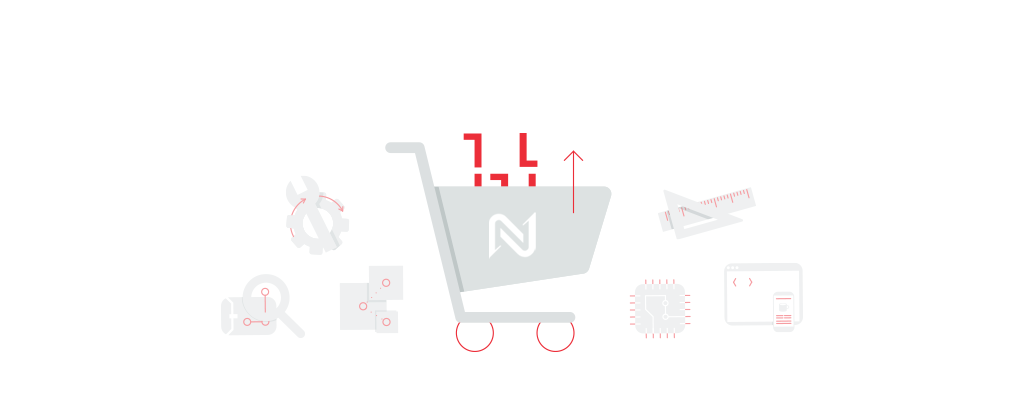As we have mentioned here a couple of times already, it is a crucial decision, which e-commerce platform to choose in order to squeeze the most out of the digital change ahead of you.
In this article we will dive deeper into the significant technological differences between two amongst the major players: Nemesis and Magento. While the latter is widely known as a medium-to-enterprise tier platform, Nemesis has been built to topple the status quo and solve issues other solutions had been proven to face.
In the following comparison we will attempt to illustrate why Nemesis has become our platform of choice and what are its advantages from the perspective of your business.
Deployment
Nemesis Commerce is build with cloud in mind. This means it can be deployed to multiple servers and can play out of the box with different services that are deployed in the same cloud environment (caching, search servers, key-value stores, etc.). Moreover, the deployment automatically scales to the traffic of your e-commerce. | Magento is built as a centralized system that has all the components built-in and runs them internally. Magento uses sticky sessions to ensure the user is always hitting the same node in the cluster and user’s session is being kept intact. This means the certain nodes in the cluster may become highly stressed (if the load-balancer is targeting the same node) while other nodes will not be stressed at all. |
Language
Nemesis is designed and built as a purely Java-based environment and runs the latest Java builds. It also leverages many well-known and documented open source libraries. This results in the smallest memory footprint of all the Java-based commerce platforms. | Magento’s architecture bears significant similarities to typical enterprise-tier solutions based on Java, however, its codebase is written in PHP, which is a surprising choice, as it generates potential problems. Running Magento’s processes in PHP may result in consumption of gigabytes of RAM during heavy-load processes and the sole fact of using PHP may result in performance issues regardless of how powerful hardware is available. |
Database
Nemesis Commerce works on any type of database, that has a Java connector to it (Currently more than 25 database types, including Oracle/PostgreSQL databases). | Magento, by default, gives you only one choice – MySQL databases. MySQL is a free database solution that is OK for small websites. However, after several years your data volume will grow immensely and generate the need of an enterprise-tier database solution, which Magento will not support. This in turn will force the transition to a different platform |
Performance
Nemesis Commerce is written entirely in Java, and Java as a language is generally faster compared to PHP. Java is precompiled and any trivial algorithm will run faster in Java than PHP. Overall, there has been a vast amount of work done to optimise Java: from improving the code, standard libraries, to JIT compilers, etc. | Magento tends to be slow, particularly on smaller, single servers. This is mitigated by bigger servers and complicated caching layers. Magento also builds indices of data and compiles this data into flattened tables (compromising storage). This is crucial, as it will affect your search engine rankings due page loading speed penalization by Google search algorithms. |
Standardization
Nemesis Commerce is written according to JCP standards. This means every implementation is flexible, while standardization keeps it working regardless of changes introduced. Moreover, every Java developer is familiar with JCP standards, so it does not require any additional knowledge or training to work with the platform. | It may be undiplomatic but safe to say Magento has been hacked together, as it does not comply with any known standard of implementation. |
Learning Curve
The learning curve is very shallow. Like we already mentioned our platform is built in accordance to well-defined standards, to which all Java developers also adhere. This makes the platform easy to understand and work with, while also significantly dropping the time-to-market. | It’s pretty steep. If you aren’t familiar with OOP/Java, or if you hate/don’t know the PHP Zend Framework very well, then you need to buy some books and spend months on learning the system. The design is sophisticated, however, learning implementation or develop extra functionalities will increase the overall time-to-market |
Complexity
Nemesis is a modern platform, built within the last few years. It attempts to hide most of the complexity from the user, relying on well known open-source java libraries and standards that most developers are familiar with. | Difficult to use – even for skilled programmers. It was released in 2008 and ever since then, a plethora of changes and updates has been implemented, dramatically increasing the platform’s complexity. Magento offers a lot in terms of possible functionalities, however, most of them are not available out-of-the-box and often their implementation is by no means obvious. |
Catalogs
Most e-commerce platforms have their idea of cataloging, which allows grouping products together. Nemesis takes it a step further allowing versions of every catalog, so each can be either “staged” or “online”. The latter is the one publicly visible to your users, while “staged” is the version you can work on as a draft, before publishing. You can prepare and test seasonal products in advance and publish the finished catalog with one click. | Magento has no catalog versioning in place. If you want to achieve the same result you need to purchase extra modules (Product Preview, Page Preview, etc). |
Scheduled and Recurring Jobs
Nemesis Commerce supports Cron jobs allowing scheduled, recurring tasks such as sending a newsletter every Friday, downloading currency exchange rates every day at midnight, or simply regenerating your sitemap for Google robot indexing. This is all possible thanks to an API which supports custom Cron jobs, allowing any scheduled actions. | Magento has no Cron job support. To achieve the same goal developers usually use system resources, which lock your deployment to a specific server, and also stress the underlying operating system even further. |
Localization
Most ecommerce solutions support multiple languages. Nemesis goes beyond and additionally supports multiple locales. This means you may have a different content for en_GB (British English) and en_US (American English). Or if you have a shop which needs to support Dutch for Netherlands and Belgium you can account for different words between the Flemish and Dutch languages. | Out-of-the-box supports only different languages and not locales. |
Starter Store
Nemesis Commerce comes with a full, rich, modern demo site to start with. This means from day one you have a working site you can start customizing – change your products, change the theme, change the style and add new pages and you are ready for the market. Customization within an already working environment is a lot easier than building something from scratch. | Magento has a very simple marketing demo, that is only usable to review its features. You can’t use it to build your production website on top of it. |
Muli-site
Nemesis is a multi-site platform. You can host multiple completely different sites, with different looks, different catalogs and products on the same platform instance. In fact, Nemesis’ starter store comes with several CMS and commerce stores working together on the same instance. Each one having a different look-and-feel, different content and different mobile store. | Magento is a single-site platform. This may be OK in the beginning, but as your business grows you will certainly need more stores. And the only way to achieve it is by adding multiple instances of Magento. |
Configuration
Nemesis offers several dedicated Back-end tools designed for the various roles in your company: product management, cms-management, customer-support, etc. Each comes with its own features and dedicated scope of functionalities. | Magento has a single administrative interface that all of the different roles in your company will use. As a result this interface is cluttered with functionalities for all the different actors – content creators, product managers, etc. |
As illustrated, the popularity of a solution does not necessarily mean it is the best possible choice. An aging and overdeveloped codebase of Magento is not allowing it to compete with modern solutions created to solve the problems of modern commerce systems.
Antologic is an authorised Nemesis distributor in Poland and Europe. We are specialized in building complex systems based on Nemesis designed and developed to solve the most sophisticated business needs.




